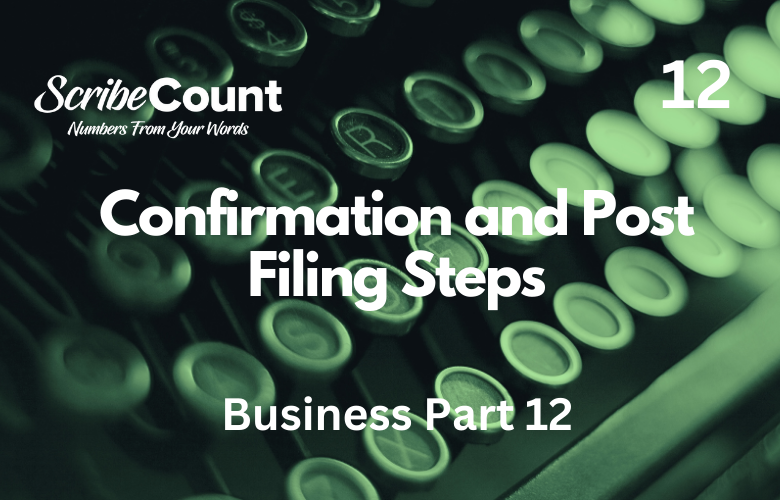What to Do After Filing Your Articles of Organization
Congratulations, you’ve just taken an important step toward building your publishing business.
Unfortunately, there are still a few more things to do.
The first of which is to wait. How long depends on how you filed your Articles of Organization. But there are a few things you can do in the meantime.
After the Delmarva Department of State approves your LLC, you will receive back a stamped and approved copy of your Articles of Organization, an Acknowledgment Letter, and a Certified Copy or Certificate of Status (if you ordered them).
If you filed online, these documents will be emailed to you in 1-2 business days. If you filed by mail, they’ll be returned to you by regular mail in 5-7 business days. If you filed in person, they’ll be returned to you before you leave.
Once you have those documents in hand, you can proceed with the post-filing steps that need to be done.
We’ll cover each step in greater detail in the following articles, we list them here so you are aware of what still needs to be done and the order in which you should do it.
Obtain Your Employer Identification Number (EIN)
An Employer Identification Number (EIN), also known as a Federal Tax ID Number, is issued by the Internal Revenue Service (IRS) and is necessary for tax reporting, hiring employees, and opening a business bank account. You can apply for an EIN online through the IRS website, by mail, or via fax at no cost.
Create an Operating Agreement
An Operating Agreement is a legal document that outlines the structure, management, and operational procedures of your LLC. Although not required in every state, having an Operating Agreement helps to:
- Define ownership percentages among members
- Establish rules for decision-making and dispute resolution
- Clarify financial contributions and profit-sharing arrangements
- Strengthen the LLC’s limited liability status
If you are a single member LLC you may think that you don’t need an operating agreement. You do. We’ll explain why in another article.
Open a Business Bank Account
To maintain legal and financial separation between personal and business finances, you must open a business bank account. Most banks require the following documents to open an account:
- Articles of Organization
- EIN confirmation letter
- Operating Agreement (if applicable)
- Business licenses or permits (if required)
A business bank account will help streamline accounting, simplify tax reporting, and establish credibility with customers and vendors.
Obtain Necessary Business Licenses and Permits
Depending on your industry and location, your LLC may require state, federal, or local business licenses and permits. Common types of licenses for authors include:
- General business licenses
- Sales tax permits (for selling taxable goods or services)
Check with your state’s business regulatory agency and local government to ensure compliance.
Register for State and Local Taxes
Certain states require LLCs to register for additional tax obligations, including:
- Sales Tax – If you sell taxable products or services
- Employer Taxes – If you have employees (Gig workers are employees)
- Franchise Tax – Some states impose an annual LLC franchise tax
Visit your state’s Department of Revenue website for specific tax requirements and registration instructions.
File an LLC Annual Report (If Required)
Many states require LLCs to file an annual report to maintain their good standing. The report typically includes:
- Business name and address
- Registered agent information
- Member or manager details
- Payment of an annual fee
Failure to file the annual report may result in penalties or administrative dissolution of your LLC. You should set a calendar reminder to assure you don’t miss the deadline.
Comply with Employer Responsibilities
If your LLC has or plans to hire employees, (personal assistants, editors, cover artist, proofreaders) you must comply with various federal and state employment regulations, including:
- Verifying employee eligibility via Form I-9
- Reporting new hires to your state’s labor department
- Withholding payroll taxes and filing necessary returns
- Obtaining workers’ compensation and unemployment insurance (if required by state law)
Maintain Accurate Financial Records
Proper bookkeeping is essential for managing your LLC’s finances and preparing for tax filings. Consider:
- Using accounting software (e.g., QuickBooks, FreshBooks, or Xero)
- Hiring a professional accountant or bookkeeper
- Keeping records of all income, expenses, and receipts*
- Maintaining a separate record for business transactions
*ScribeCount has features to automatically gather and track income and expenses related to all aspects of the self-publishing process.
Protect Your Business with Insurance
Depending on your income and business structure, having business insurance may be necessary to protect your LLC from liability and financial risks. Common types of insurance for authors and publishers include:
- General liability insurance
- Professional liability insurance
- Workers’ compensation insurance
- Commercial property insurance
- Business interruption insurance
Consult an insurance professional to assess your specific business needs.
Build Business Credit
Establishing business credit can help your LLC secure loans, lines of credit, and better vendor terms. To build business credit:
- Obtain a business credit card
- Open accounts with vendors that report to business credit bureaus
- Make timely payments to suppliers and creditors
- Monitor your business credit score with agencies like Dun & Bradstreet, Experian, and Equifax
Understand Ongoing Compliance Requirements
Beyond initial setup, LLCs must adhere to various legal and regulatory requirements, including:
- Filing state and federal taxes
- Renewing business licenses and permits
- Keeping business records updated
- Holding regular meetings (if specified in the Operating Agreement)
Staying on top of these obligations ensures your LLC remains in good standing with state and federal authorities.
Consider Electing S-Corp Status (If Beneficial)
By default, LLCs are taxed as pass-through entities. However, you may choose to elect S-Corporation (S-Corp) status for potential tax savings. An S-Corp election allows:
- Owners to pay themselves a reasonable salary and take additional profits as distributions, potentially reducing self-employment taxes
- A more structured payroll and tax withholding system
Consult a tax professional to determine whether an S-Corp election is beneficial for your LLC.
Develop a Business Growth Strategy
Once your LLC is fully operational, focus on growth by:
- Creating a marketing strategy
- Building a professional website and online presence
- Networking with fellow authors and industry professionals
- Exploring financing options for expansion
A well-planned growth strategy helps sustain and scale your business over time.
Conclusion
Filing your Articles of Organization is just the beginning of running a successful LLC. Following these steps ensures your business is legally compliant, financially structured, and well-prepared for future growth. By staying organized and proactive, you can maximize the benefits of your LLC while minimizing potential risks and liabilities.

